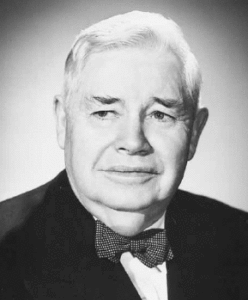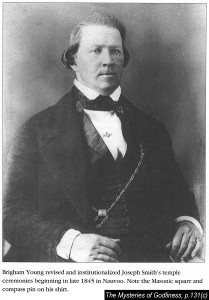In Part I several revelations were gathered and organized according categories of revelation found in the Doctrine and Covenants. I will now discuss the reasons that the First Presidency and the Quorum of the Twelve are so slow to canonize and why the method of revelation is different than in the time of Joseph Smith. Then I will offer a suggestion to fix the problem of an open canon that has essentially been closed.
Why Don’t they Canonize?
Thus Saith the Lord
Early prophets (particularly Joseph Smith) speaking in the first person as the Lord in their revelations is a separate but related issue to canonization. J. Reuben Clark, Jr. said, “There are those that insist that unless the Prophet of the Lord declares, ‘Thus saith the Lord’ the message may not be taken as a revelation. This is a false testing standard. For while many of our modern revelations as contained in the Doctrine and Covenants do contain these words, there are many that do not.” (Church News, July 31, 1954.) It can be hard to determine when what our leaders teach today is revelation when there is no “thus saith the Lord” or other similar statements. It would sure make it easier to differentiate between general teaching and revelation. However I do agree with J. Reuben Clark, not all section of the D&C contain “Thus saith the Lord” or have the first person voice of God. The letters from Joseph Smith and the vision of the Spirit World in section 138 are just two examples. The Official Declarations aren’t even revelations but statements that a revelation has been received.
The last record of a leader saying “Thus saith the Lord” was Wilford Woodruff in 1898 (https://www.sunstonemagazine.com/wp-content/uploads/sbi/articles/023-18-25.pdf). Why don’t our leaders say “Thus saith the Lord” anymore? I have a couple of hypotheses:
1) It may just be a change in style.
Joseph Smith favored to give revelations in first person for the Lord. It was how he best received revelation. Leaders directly after him mimicked this style. It may be that more modern leaders found that they didn’t receive revelation in that way and so discontinued it.
2) Church leaders may be afraid of being wrong
Or that their prophecies will later be discounted. Because the General Authorities no longer use “Thus saith the Lord,” church members don’t know what to accept as scripture so they take everything as scripture. Gordon B. Hinckley was sometimes afraid that words would be taken as prophecy. He said, “Now, brethren, I want to make it very clear that I am not prophesying, that I am not predicting years of famine in the future. But I am suggesting that the time has come to get our houses in order.” (“To the Boys and To the Men,” General Conference, October 1998). Another example of this is when President Hinckley’s advice on earrings became an inspired, eternal principle. It’s embarrassing how often the example of modern counsel from church leaders is how many earrings to wear. There have to be better examples of inspired leadership than that.
A counterpoint to the overzealousness of church members to accept statements from General Authorities as revelation is the following statement from Brigham Young: “I am more afraid that this people have so much confidence in their leaders that they will not inquire for themselves of God whether they are led by him. I am fearful they settle down in a state of blind self-security, trusting their eternal destiny in the hands of their leaders with a reckless confidence that in itself would thwart the purposes of God in their salvation, and weaken that influence they could give to their leaders, did they know for themselves, by the revelations of Jesus, that they are led in the right way. Let every man and woman know, by the whispering of the Spirit of God to themselves, whether their leaders are walking in the path the Lord dictates, or not” ( Discourses of Brigham Young, selected by John A. Widtsoe, Salt Lake City: Deseret Book Company, 1941, page 135). I agree with Brigham Young. It is important to pray and receive a witness for every principle taught. Nothing should be taken on faith. However, this statement is about accepting principles in our own lives. One easy way to differentiate between good counsel and revelation is canonization. Once a revelation is canonized then it is clearly for the whole church. It has then been approved by the governing leaders as well as the body of the church. I’m not saying that then means you don’t have to pray about it, just the opposite. Everyone has a chance to pray about it and determine if it is fit for the body of all members.
An example of church leaders being afraid to canonize or call something scripture is the Proclamation on the Family. This Proclamation has been treated like a canonized document. There are several Ensign articles recommending that the Proclamation should be memorized. It has been quoted constantly in General Conference. It is signed by the First Presidency and the Quorum of the Twelve Apostles. However, the scriptures have been revised in 2013, and the Proclamation still hasn’t been canonized. The First Presidency and the Quorum of the Twelve aren’t even sure if it is a revelation. In “Cleansing the Inner Vessel,” a talk by President Packer in the October 2010 General Conference, he said, “It qualifies according to the definition as a revelation and would do well that members of the church to read and follow it.” However, when the text of the talk was released that was changed to, “It is a guide that members of the Church would do well to read and to follow.” Could it have been a simple slip of the tongue? I find it unlikely. It’s more likely that there was a discussion with the Quorum of the Twelve and/or the First Presidency and the change was recommended. This to me is evidence that the General Authorities aren’t confident that even their official Proclamations are written by revelation. It seems to be the strongest candidate for canonization, but 17 years after it was given it still remains only a frequently published document that is framed on lots of people’s walls.
One more example of the fear to canonize is the length of time it took the vision of the Spirit World by Joseph F. Smith to be canonized. The revelation was received in 1918, but wasn’t added to the Pearl of Great Price until 1976 (it was later moved to the Doctrine and Covenants). While Official Declaration 2 was canonized shortly after it was released, this coincided with the new Standard Works publication, and was a major announcement that required being in the scriptures. However, it wasn’t even included as a section; it only made it as an Official Declaration, setting it apart from the revelations of Joseph Smith.
3) Joseph Smith was unique in his capability for inspiration
Some say that most great revelations are received by prophets that start a dispensation (such as Moses), and revelation slows after the truth has been restored. They point to the fact that even Joseph Smith’s revelations decreased as time went on. He transitioned from receiving a revelation about everything to providing instruction through preaching and letters. Elder Bruce R. McConkie said, “You start out with the Lord Jesus, and then you have Adam and Noah. Thereafter come the dispensation heads. Then you step down, appreciably, and come to prophets and apostles, to the elders of Israel, and to wise and good and sagacious men who have the spirit of light and understanding…[E]very dispensation head is a revealer of Christ for his day; and every other prophet or apostle who comes is a reflection and an echo and an exponent of the dispensation head. All such come to echo to the world and to expound and unfold what God has revealed through the man who was appointed for that era to give his eternal word to the world” (“This Generation Shall Have My Word through You,” in Hearken O Ye People: Discourses on the Doctrine and Covenants, Sperry Symposium 1984, pp. 4-5). Joseph Smith may have been given a special gift for revelation that current leaders are not given because they do not need to open a dispensation. However, I’ve already attempted to show that revelation continues to be received. Certainly some things could be canonized.
More recent leaders have described their inspiration in somewhat more typical terms of listening for the Holy Ghost rather than hearing the Lord’s voice, having visions, or speaking with angels. J. Reuben Clark said, “We are not infallible in our judgment, and we err, but our constant prayer is that the Lord will guide us in our decisions, and we are trying so to live that our minds will be open to His inspiration” (April 1940 General Conference). I’m familiar with this type of revelation. It’s described in D&C 9, “But, behold, I say unto you, that you must study it out in your mind; then you must ask me if it be right, and if it is right I will cause that your bosom shall burn within you; therefore, you shall feel that it is right.” So according to this our church leaders think things through and pray about them. They find the best possible solution and pray for inspiration. This means they can sometimes be wrong. If this is the case then canonization would be a useful tool for letting church members know when the counsel or doctrine is inspired. In other words, when it becomes clear to the leadership that it was indeed an inspired decision, it can be canonized and become binding on the members.
J. Reuben Clark said, “[E]ven the President of the Church, himself, may not always be ‘moved upon by the Holy Ghost,’ when he addresses the people. This has happened about matters of doctrine (usually of a highly speculative character) where subsequent Presidents of the Church and the peoples themselves have felt that in declaring the doctrine, the announcer was not ‘moved upon by the Holy Ghost.’ “How shall the Church know when these adventurous expeditions of the brethren into these highly speculative principles and doctrines meet the requirements of the statutes that the announcers thereof have been ‘moved upon by the Holy Ghost’? The Church will know by the testimony of the Holy Ghost in the body of the members, whether the brethren in voicing their views are ‘moved upon by the Holy Ghost’; and in due time that knowledge will be made manifest” (J. Reuben Clark Jr., “Church Leaders’ Words,” 10). This is great. I wish it worked that way in practice. Our prophets and apostles can speculate in Doctrine, and the members and General Authorities can try it out and pray about it. When the Holy Ghost speaks in the body of the members, than revelations can be canonized.
IV. Solutions
The argument that we need to study what we already have before we’re given more canonized scripture doesn’t hold water. We keep getting General Conferences twice a year whether we read/listen to what they say or not. You may have heard a similar argument in 2 Nephi 29: “A Bible! A Bible! We have got a Bible.” If God only reveals things to our leaders if all of the church members are diligently reading the Standard Works than we’re in big trouble. According the Old Testament the Israelites were constantly wicked but that didn’t stop the Prophets from writing scripture.
Example of the Community of Christ
The Community of Christ, formerly the Reorganized Church of Jesus Christ of Latter-Day Saints, continue to add sections to their D&C. Some scriptural literalists criticize the Community of Christ for being liberal and trying to be “just another Protestant denomination,” yet they add more regularly to their canon than the LDS church does. Their Prophet-President chooses important topics and writes a new section of the Doctrine and Covenants, and then it is presented to the body of the members (http://www.cofchrist.org/D&C164/). The revelation is then temporarily pasted to their printed scriptures until a new print run is made. This eliminates the argument that our church avoids canonization so that new printings aren’t required. Is revelation really limited by the cost of printing? I hope not.
I wish that our church would take a similar position. I’ve heard a lot about President Monson’s “Rescue” program but I haven’t heard much about it from him. He could write a statement or First Presidency letter on this important topic and present it in General Conference and voted upon. It could be voted on either in the conference it is presented, or at a later one after members have had a chance to study and pray about it. This could be an easy way to canonize present revelations as well as to emphasize certain topics, ideas, and doctrines for the current time. Many of the uncanonized revelations listed along each category of the Doctrine and Covenants could have been presented and canonized in this fashion.
Instead of simply announcing changes such as the restructuring of quorums of the Seventy, it could be released as a revelation and canonized. These changes become more significant to church members. It will definitely be easier to see how revelation has guided the church. Currently it is necessary to read journal articles or obscure books to learn about most changes to the church post-Joseph Smith. The Gospel Doctrine manual on Doctrine and Covenants and Church History would be greatly benefited. The resources on post-Joseph Smith revelations would be greatly simplified. Anyone with scriptures would have access to them. After all, First Presidency letters aren’t even available in an easily accessible publication for members to read.
Conclusion
Maybe my recommendations for change and suggestion that General Authorities don’t canonize out of fear are overstepping my bounds. However, I think that I come from a position of honoring the revelations that have been received, and hoping that they will be canonized. I want church members to be excited about revelation. I want church members to expect it and hope for it. Is it really wrong to hope for revelation? I don’t think so. We members can be criticized for not seeing the inspiration that is received, but we can’t be faulted for not finding it in our Doctrine and Covenants. I simply want the “open canon” that we’ve been promised, and I hope the Prophet and apostles will fill it with revelation.








Here’s hoping the Proclamation on the Family will not be canonized.
Excellent analysis. I especially enjoyed the observation that the 2013 scriptures would have posed an ideal time for the Proclamation to be canonized but it wasn’t. That omission ought to send a message that it is a timely and inspired declaration of the viewpoints of 15 influential, thoughtful members of the Lord’s current leadership, but that it has not yet qualified to be considered a timeless declaration of the mind and will of the Lord. Everything that is timeless is timely, but very little of what is timely is timeless.
Very interesting thoughts, L Thomas. I do not think you can be faulted for wanting more revelation.
Here’s a thought. When the 2013 scriptures were announced, they said that print editions won’t be available until August. Isn’t it possible that we might be asked to vote on the canonization of the Proclamation in a few weeks at GC?
Hagoth, it’s a tempting thought. I think it’s unlikely, but we can hope. I’m split between the arguments against the Proclamation on the Family and the hope that something will be canonized. It appears that the new scriptures are already being published even though they’re not yet available in print. It would be pretty presumptuous to plan for the Proclamation before presenting it to the members, but it would be safe to assume that few would oppose. Obviously the new scriptures are already available digitally, though that’s the easiest place to put in new things.
This blog is quite old now (in internet years), but I was right that we didn’t vote on anything to be canonized along with the new scriptures. Too bad.
I had never really thought about this. In fact, I believed ‘The Family Proclamation’ was considered scripture in the church, that’s how it is treated. This post had really got me to think about what is scripture and what is simply mormon culture in a much deeper level. Thank you!